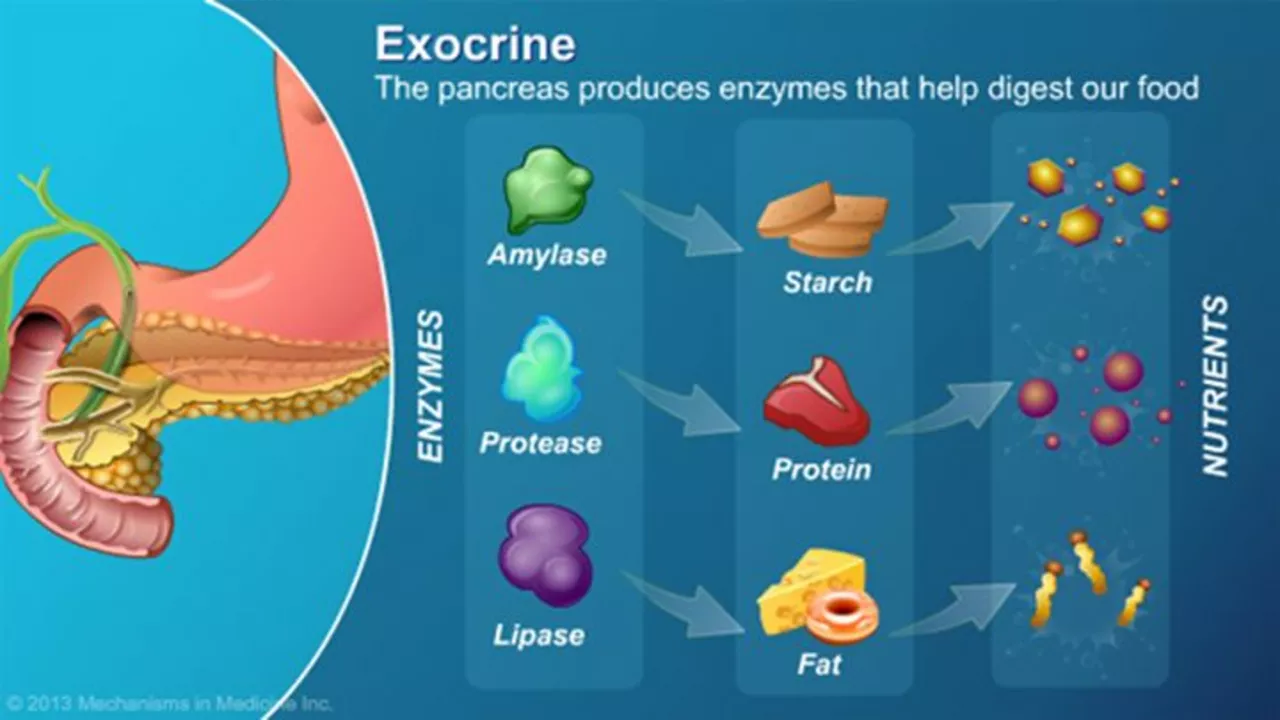Understanding Pancrelipase and Its Role in Digestion
Pancrelipase is a medication that contains a combination of digestive enzymes, including lipase, protease, and amylase. These enzymes are naturally produced by the pancreas and play a crucial role in the digestion of fats, proteins, and carbohydrates. People with certain medical conditions, such as cystic fibrosis or chronic pancreatitis, may not produce enough of these enzymes, leading to digestive problems and malnutrition. In such cases, pancrelipase can be prescribed to help with digestion and ensure the body gets the nutrients it needs.
Now that we have a basic understanding of what pancrelipase is and its role in digestion, let's explore its connection to bariatric surgery and why it's important for patients undergoing this type of weight loss procedure.
The Relationship between Bariatric Surgery and Pancreatic Enzyme Insufficiency
Bariatric surgery is a type of weight loss surgery that aims to help patients with obesity lose weight by altering the digestive system. There are various types of bariatric surgery, such as gastric bypass, sleeve gastrectomy, and adjustable gastric banding. These procedures work by either reducing the size of the stomach or by changing the way the body absorbs nutrients.
One potential side effect of bariatric surgery is pancreatic enzyme insufficiency (PEI). This occurs when the pancreas doesn't produce enough digestive enzymes to break down food properly. PEI can lead to malabsorption of nutrients, causing symptoms such as diarrhea, weight loss, and malnutrition. In some cases, bariatric surgery patients may be prescribed pancrelipase to help manage their PEI and alleviate these symptoms.
How Pancrelipase Can Help Bariatric Surgery Patients
For bariatric surgery patients experiencing pancreatic enzyme insufficiency, taking pancrelipase can be a game-changer. By supplementing the body's natural production of digestive enzymes, pancrelipase can help ensure that food is broken down more effectively, allowing for better absorption of nutrients. This can lead to improved overall health, better weight loss outcomes, and a reduced risk of malnutrition.
It's important to note that pancrelipase should be taken under the guidance of a healthcare provider, as the dosage may vary depending on the individual's specific needs and the severity of their enzyme insufficiency. Additionally, some patients may require other dietary supplements or adjustments to their diet to fully address any malabsorption issues.
Monitoring Your Health after Bariatric Surgery
After undergoing bariatric surgery, it's crucial to closely monitor your health and work with your healthcare provider to address any potential complications or side effects, such as pancreatic enzyme insufficiency. Regular follow-up appointments and communication with your healthcare team can help ensure that any issues are identified and addressed as soon as possible.
In addition to taking prescribed medications like pancrelipase, there are several other steps you can take to support your health after bariatric surgery. These may include maintaining a healthy, balanced diet, engaging in regular physical activity, and taking any recommended vitamin or mineral supplements. Taking a proactive approach to your health can help you achieve the best possible outcomes from your bariatric surgery.
Conclusion: Pancrelipase and Bariatric Surgery
In conclusion, pancrelipase can be an essential tool for bariatric surgery patients experiencing pancreatic enzyme insufficiency. By helping to break down food more effectively, pancrelipase can improve nutrient absorption, support weight loss goals, and reduce the risk of malnutrition. As with any medication, it's important to work with your healthcare provider to determine the appropriate dosage and treatment plan for your individual needs.
Bariatric surgery can be a life-changing procedure for those struggling with obesity, but it's crucial to stay proactive about your health and monitor for any potential complications. With the right support, including the possible use of pancrelipase, you can work towards a healthier, happier life after bariatric surgery.







Comments
Gary Marks
19 May 2023Pancrelipase is not the miracle cure the article suggests. First off, the idea that pancrelipase is some magical glitter that will instantly rescue bariatric patients is pure fantasy. Sure, enzyme supplements can help when the pancreas is truly failing, but most people who have a sleeve or a bypass never develop full‑blown pancreatic insufficiency. The article conveniently skips over the fact that diet, proper chewing, and careful macronutrient selection are the real heroes after surgery. You can’t just pop a pill and expect your body to start absorbing fats like a toddler at an ice‑cream buffet. There are countless studies that show a minority of post‑bariatric patients need enzyme therapy, and those studies are buried under layers of pharmaceutical marketing fluff. What the author fails to mention is that pancrelipase is costly, often requires insurance gymnastics, and can cause side effects like abdominal cramping and fibrous stools. If you’re already dealing with the financial fallout of a $30,000 surgery, adding a $200‑a‑month medication is a punch to the gut. Moreover, the dosing schedule is a nightmare; you have to time the pills with each meal and snack, which defeats the whole point of simplifying your life after weight loss. And let’s not ignore the reality that many surgeons prefer to monitor micronutrients first, not jump straight to pancreatic enzymes. Patients who ignore proper vitamin D, B12, and iron supplementation are more likely to suffer complications than those who take a generic enzyme pill. In short, the post reads like an advertisement written by someone who has never faced the real grind of post‑operative care. If you want a balanced view, ask your dietitian, read the primary literature, and don’t be swayed by hype that sounds like a late‑night infomercial. The only thing that should be "essential" here is a solid follow‑up plan, not a single drug touted as a cure‑all. So before you start buying pancrelipase by the bottle, remember that your body is smarter than any supplement marketing script. And finally, spare us the melodramatic conclusions that sound like they were written by a poet on a sugar‑high.
Steven Young
19 May 2023These so‑called “essential” enzymes are probably part of a hidden agenda controlled by pharma giants pulling strings behind the scenes and no one tells you about it.
Ben Collins
19 May 2023Oh wow, because I was just waiting for a magic pill to fix my bariatric surgery, said no one ever.
Denver Bright
19 May 2023I guess mentioning personal experiences about enzyme trials here might be crossing a line but I’ve noticed some patients report weird taste after taking the pills.
Kelli Benedik
20 May 2023Wow, the drama of discovering that a tiny pill could change your life – it’s like finding a glittering unicorn in your kitchen cabinet! 🌈🤯 My heart raced the moment I read about pancrelipase, and then the tears started when I realized my grocery list suddenly needed a new column for “enzyme dosage.” It’s so intense, you’d think I was starring in a soap opera about nutrient absorption! 😂💔 But seriously, the emotional roller‑coaster of hoping this miracle drug works while fearing side effects is real, and the emojis just can’t capture the depth of that panic.
Kevin Hylant
20 May 2023Enzyme timing is important and you should take them with meals.
Holly Green
20 May 2023You don’t need a supplement if you follow the diet plan.
Craig E
20 May 2023When we consider the interplay between surgical alteration of the gut and the body’s innate enzymatic processes, it becomes clear that a nuanced, patient‑centered approach is required. Rather than viewing pancrelipase as a stand‑alone solution, it should be integrated into a broader strategy that includes regular monitoring, dietary adjustments, and psychological support. The philosophical takeaway is that health is a tapestry woven from many threads, not a single silver bullet.
Marrisa Moccasin
20 May 2023It’s fascinating, isn’t it, how the medical community can sometimes push a single medication, like pancrelipase, as a universal fix, while ignoring the myriad variables-diet, genetics, lifestyle, even the hidden agendas of pharmaceutical corporations, that all intertwine to affect patient outcomes?!
Caleb Clark
20 May 2023Hey folks, just wanted to throw some positive vibes your way! 😊 After bariatric surgery, staying motivated is key, and remember that consistency beats perfection every time. Keep your meals balanced, stay active, and don’t forget to hydrate – water is your best friend! If you’re considering pancrelipase, talk to your doctor and follow the dosing schedule like a champ. Even when you hit a plateau, know that every small step counts towards your big goal. You’ve got this, and we’re all cheering you on! Keep pushing, stay strong, and celebrate the little wins – they add up to massive success! 💪🏽